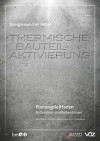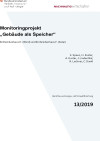Suchergebnisse
SQUARE - Qualitätssicherung in der Gebäudesanierung
Entwicklung eines systematischen, flexiblen Qualitätsmanagements für Sanierungsprozesse. Es soll zu qualitativ hochwertigen Sanierungen führen, die sich in verbesserter Energieeffizienz und einem verbesserten Wohnraumklima von Wohngebäuden zeigen.
Photovoltaic solar modules for building integration
Development of new manufacturing technique for photovoltaic solar modules, which fulfil the special requirements of building integration.
City Cooling - Intelligente Fernkälteversorgung Wien
Konzeptentwicklung für eine intelligente Fernkälteübergabe und alternative Rückkühlung von zentralen Groß-Absorptionskälteanlagen am Fallbeispiel des Wiener Stadtteils TownTown
Energiespeicher Beton: Thermische Bauteilaktivierung. Planungsleitfaden Einfamilien- und Reihenhäuser

Im Planungsleitfaden "Heizen und Kühlen mit Beton" werden die Erkenntnisse bisheriger Forschungsprojekte zur Bauteilaktivierung zusammengefasst, es wird gezeigt, wie Energie in massiven Bauteilen über längere Zeit gespeichert und zu beliebigen Zeitpunkten wieder abgerufen werden kann. Der Planungsleitfaden ist mit detaillierten Anleitungen auf die Bedürfnisse von Planenden und Bauausführenden sowie auf die Wissensvermittlung zur Aus- und Weiterbildung konzipiert.
Felix Friembichler, Simon Handler, Klaus Krec, Harald Kuster
Herausgeber: BMVIT
Deutsch, 122 Seiten
Downloads zur Publikation
Sunny Energy Building: ENERGYbase - Office building of tomorrow
Energybase is a showcase project in terms of energy efficiency and use of renewable energies realized by the Vienna business agency. With 7.500 sqm net floor area ENERGYbase provides space for innovative business and research and development on the field of green energy.
Gründerzeit with future - demonstration project 1: David´s Corner
High value energy efficient refurbishment of an ensemble of three neighbouring Wilhelminian style buildings in a non-lucrative location.
MODESTORE - Modular High Energy Density Sorption Heat Storage

Seasonal storage of solar heat for use in low energy and passive houses (new buildings as well as old buildings).
Gründerzeit mit Zukunft - Demonstrationsprojekt 1: David´s Corner
Energetisch hochwertige Sanierung von drei benachbarten gründerzeitlichen Wohnhäusern in ertragsschwacher Lage.
Monitoringprojekt „Gebäude als Speicher“. Einfamilienhaus H. (Wind) und Einfamilienhaus F. (Solar)

Monitoring und Vergleich der Leistungsfähigkeit der Thermischen Bauteilaktivierung in zwei bauähnlichen, bewohnten Einfamilienhäusern mit unterschiedlichen Energiequellen (Windstrom bzw. Solarenergie). Zentrales Anliegen ist es, die Funktionalität der Energieversorgung durch Wind- bzw. Photovoltaikstrom in Verbindung mit einem thermischen Speicher zu untersuchen. Die Ergebnisse liefern Erkenntnisse hinsichtlich Berechnungsannahmen, Anlagensteuerung sowie Umsetzbarkeit eines Smart-Grids.
Schriftenreihe
13/2019
S. Spaun, H. Kuster, A. Kuster, J. Lindenthal, R. Lechner, C. Dankl
Herausgeber: BMVIT
Deutsch, 53 Seiten
Downloads zur Publikation
Passivhaustauglicher Scheitholzofen kleiner Leistung

Scheitholzofen kleiner Leistung, der für den Einsatz im Passivhaus optimiert wird. Durch "gedämmte Speichermassen" in Verbindung mit Klappen zur Regulierung der Abgabeleistung soll der gewünschte Leistungsbereich <1 kW (bis max 3kW Spitze) erreicht werden.
Innovativer Solarregler für thermische Solaranlagen
Erforschung der technischen Machbarkeit eines Solarreglers für thermische Solaranlagen, welcher ohne konventionelle Kollektor- u. Speichertemperaturfühler auskommt
Buildings of highest energy-efficiency with integrated renewable energy development
For the future supply of energy services the combination of energy efficiency, energy storage and decentralized use of renewable energy in buildings offers itself. The project identified dynamic potentials of possible active and passive energy yields of construction units with use of renewable energy sources, pointed future solutions to energy-efficient and ecological design of building construction-units and united all results to a signpost: From today's passive house to the energy-plus-house of the future.
thermocollect: realisation of a plus energy building by a solar active facade system
The project demonstrates the application of a solar active facade system in the course of the renovation of an existing building in order to achieve the plus-energy standard. Moreover, the effectiveness of the system will be demonstrated on new buildings and transparent components as well. The final outcome will be a manual for the application and implementation of the façade system focusing on the segment of specialists and skilled labour.
SOLROSE FP - bionisch designter Solarkollektor, finale Produktgestaltung
Ziel war es den innovativen solarthermischen Kollektor SOLrose vom Prototypen zu Serientauglichkeit fertig zu entwickeln. Verbesserungen SOLrose gegenüber Stand der Technik: Ansprechendes Design auch für Fassadenintegration, Serienproduktion der Systembausteine, Verbesserungen für Vertrieb und Montage.
CiQuSo - City Quarters with optimised solar hybrid heating and cooling systems
The project CiQuSo aimed to develop, evaluate and optimize concepts for solar energy systems to provide energy for buildings and cities. The applicability of the developed methods and concepts were shown as an example at Itzling, a part of Salzburg city.
PEAR - Prüfstand für energieeffiziente Automation und Regelung von Gebäuden
Der mit dem Planungsstand errechnete Energiebedarf deckt sich oft nicht mit den gemessenen Werten des Betriebs. In diesem Projekt werden Automation und Regelung auf den Prüfstand gestellt und eine Lösung zur Bewertung der Energieeffizienz von Regelstrategien in den Bereichen Raumlufttechnik, Betonkernaktivierung und Free Cooling entwickelt, welche anhand des Bauprojekts „Post am Rochus“ validiert wird.
Development of thermal solar systems with unproblematic stagnation behaviour
Research on the influence of collector hydraulics, piping and the arrangement of plant components on the stagnation behaviour of thermal solar systems.
smartEXT - extended application boundaries for proven passive house technology
The present study aims to explore the application options for compact units (ventilation devices including micro heat pumps, developed for passive houses) in low energy buildings. Compact ventilation units for heat recovery, heating and domestic hot water shall bear the basic heating load, whereas peak loads shall be covered by newly-developed auxiliary heating equipment combined with intelligent control algorithms. This allows increased energy efficiency as well as cost effectiveness together with higher living quality and lower ecological load.
Indicators for urban areas – for construction, operation and mobility in climate-friendly areas
Development and coordination of indicators for energy and ecological evaluations of urban areas based on the Swiss 2000-Watt certification system. The results will be used for the development of a quality assurance system for urban areas similar to the klimaaktiv declaration for buildings and the e5 certification for communities.
solSPONGEhigh - Hohe solare Deckungsgrade durch thermisch aktivierte Bauteile im urbanen Umfeld
Im Forschungsprojekt solSPONGEhigh wurde die intensive Nutzung von thermisch aktivierten Bauteilen (TABs) als zusätzlicher thermischer Speicher in verschiedenen Gebäuden unter vorrangigem Einsatz von Solartechnologien (Solarthermie bzw. Photovoltaik) untersucht. Die Arbeitshypothese ging davon aus, dass durch die Aktivierung und Nutzung der bauteilimmanenten thermischen Speicher eine Deckung des Gebäudeenergiebedarfs mit Solartechnologien von bis zu 100 % erreicht werden könnte.
